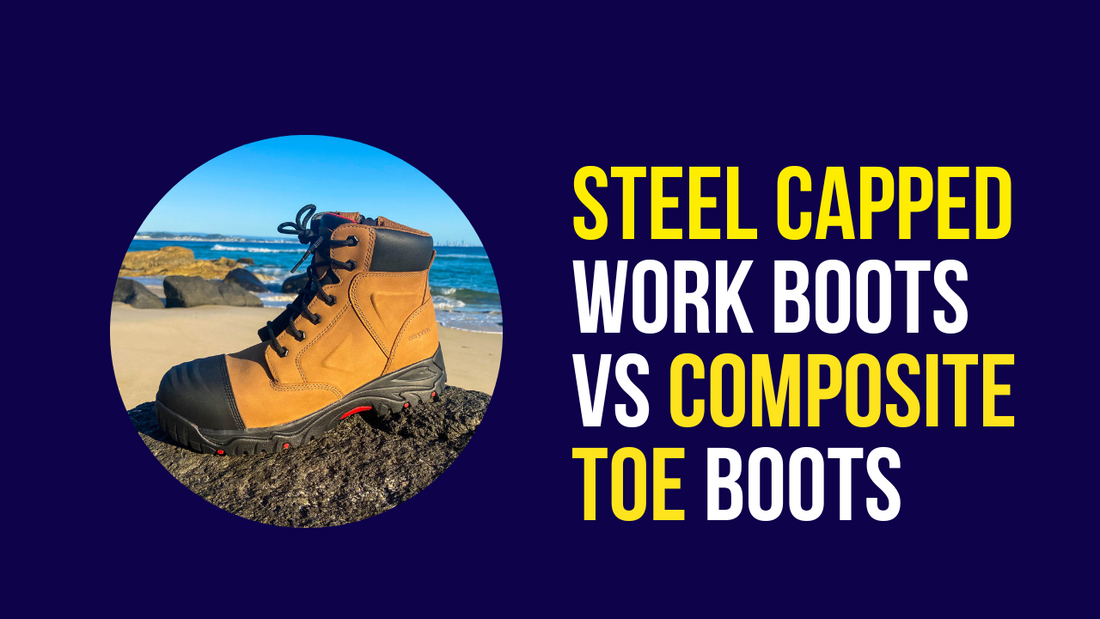Why are steel cap work boots safety boots worn on job sites?
Safety boots are an essential piece of personal protective equipment (PPE) that should be worn in a variety of different work environments. Protective footwear should protect you from falling objects, heavy machinery, electrical hazards, and pretty much anything that could cause injury to your feet. Furthermore, they minimize the chances of falling on slippery or uneven surfaces.

In addition to providing protection from injury, a good pair of arch-support steel cap boots is also key to preventing foot fatigue. Since you will be spending many working hours on your feet, a comfortable well-fitting pair of boots can make a huge difference when it comes to avoiding foot pain and overuse.

How do I choose steel cap boots that are right for me?
Choosing the right boot greatly depends on the nature of your job and work environment. For construction, a boot made with a durable material and support features would be preferable to a protective boot alone.

If you have a foot condition, such as flat feet, it is also important to ensure your boot has an adequate amount of support and cushioning. Wearing orthotic insoles with your work boots can help relieve pressure and strain on your foot’s ligaments and muscles. Insoles also correct abnormal motions that can contribute to foot pain, leg pain, and even, hip and back pain.

Why opt for composite toe boots VS steel cap work boots
Comparing their performance – Steel Cap vs Composite Protective Toe
In tests conducted based on current Australian standards, there were no significant differences in performance between steel toe boots and composite toe boots. These tests included impact assessments as well as crush tests. At the end of the day, it has generally been found that these two boots do not differ much in how well they protect your feet.

Composite toe boots are 40% Lighter
Composite toe boots are often made from strong non-metal materials, including carbon fiber or fibreglass. Because they do not contain metal, they are 40% lighter on the feet and easier to carry around across the workday. You will be able to wear your boots for long periods of time.
One of the biggest impacts we can have on physiological strain is weight reduction in our footwear on site. Both men and women report a reduction in effort when they use brands that range of boots that are lighter in weight.

Composite toe boots provide better insulation vs Steel toe
When comparing thermal conductivity, it was found that composite boots had a lower thermal conductivity than that steel-toe boots. This means that composite toe boots are a better insulator against heat and thermal energy. Enhanced insulation is especially vital if you are working in an area that receives a lot of sunlight as it can keep your feet cooler, reduce sweating, and boost comfort. Insulation also helps to keep heat trapped within the boot in environments that are colder. In other words, your feet will be kept warmer in settings where it is needed.

Composite toe cap boots are easier to transport – Airport Friendly
Because they do not contain metal components, composite toe boots are airport friendly as they will not set off metal detectors. This makes them easier to bring with you wherever you are going.

Electrically non-conductive
A composite toe cap is also a better electrical insulator than the traditional steel cap work boots. This will add a further level of protection over steel cap boots.

Protective scuff cap
The addition of a protective scuff cap can improve the look of your boots by keeping them clean and it can also keep you compliant on the job site by not having worn-out boots.

Steel cap boots have traditionally been the material of choice when using a protective toe workboot. In recent times the composite toe cap has been used as it is a 40% lighter, better thermal insulator, electrically non-conductive, airport-friendly material that will protect you to the same standard as the traditional steel cap. We use composite toe caps in our Ergonx workboots range and so do many other boot brands across Australia such as hard yakka, steel blue and Mongrel.
Got some more questions about safety boots?
If you have some more questions about safety boots, safety shoes, footwear in general or composite toe boots and steel toe boots specifically, please comment below or visit docpods.com.au
Please visit our webpage to see our range of footwear brands for delivery in Australia and we offer free shipping for orders over a threshold.
About the Author:
Kent Elliot (Podiatrist). B App. Sc. Pod (Hons), B.Sc(HMS). M.A. Pod. A
Kent graduated from the University of Queensland with a Bachelor of Science (majoring in Human Movement Studies) and from Podiatry at The Queensland University of Technology (QUT). During this time Kent took a special interest in exercise and conditioning training, orthotics, heel pain and plantar fasciitis. Kent has a personal interest in and has participated in many sports including rugby, athletics, boxing, tennis, and running.
Kent has been working as a private practice Podiatrist since 2003 and is registered with AHPRA (The Australian Health Practitioner Regulation Agency (AHPRA) is a Medibank Private Preferred Provider, Hcf More For You Provider and a Bupa Members First Healthcare Provider.

